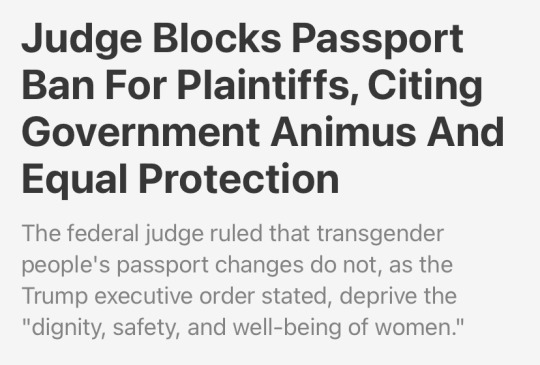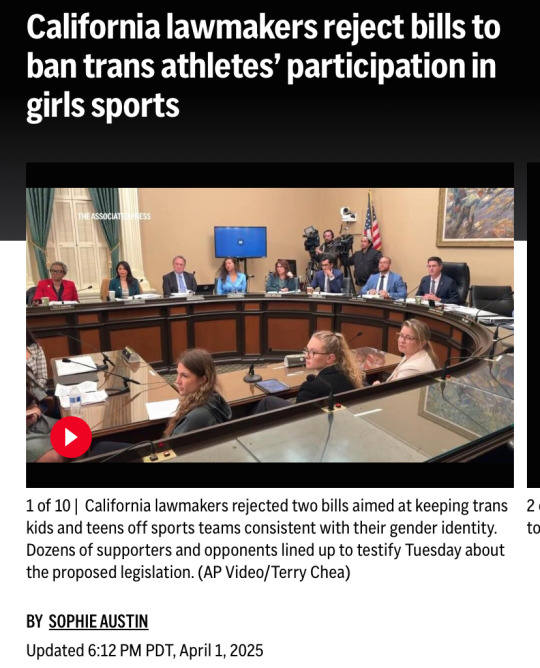Text
Well shit, the Republicans brought a certain anti-online porn bill back to the table.
The Interstate Obscenity Definition Act.
This should alarm you guys.


21K notes
·
View notes
Text
it's been said before but i'll repeat it
allistic people will never know the sublime joy of stacking cans
4 notes
·
View notes
Text
There's a lot of Wormfic that sucks, but I feel like the average readability of Wormfic is noticeably higher than the average readability of, say, Narutofic or ScottPilgrimfic. (Examples used because they're other fandoms I've read a lot of fic in and I know I'm right.)
My guess is that Worm, being 1.6 million words and grimdark, has an audience that skews older and more literate; and that the act of reading 1.6 million words gives you at least a few Skill Points (Language).
9 notes
·
View notes
Text

YO?
I imagine some trans person or enby changing their name like.
-> Goes to Wiktionary.org -> Clicks "Random entry" -> My name is now ጭምብል
14K notes
·
View notes
Text
it’s safe to say i think about this video at least four times a day, i can quote almost the whole thing from memory
77K notes
·
View notes
Text
The data does not support the assumption that all burned out people can “recover.” And when we fully appreciate what burnout signals in the body, and where it comes from on a social, economic, and psychological level, it should become clear to us that there’s nothing beneficial in returning to an unsustainable status quo.
The term “burned out” is sometimes used to simply mean “stressed” or “tired,” and many organizations benefit from framing the condition in such light terms. Short-term, casual burnout (like you might get after one particularly stressful work deadline, or following final exams) has a positive prognosis: within three months of enjoying a reduced workload and increased time for rest and leisure, 80% of mildly burned-out workers are able to make a full return to their jobs.
But there’s a lot of unanswered questions lurking behind this happy statistic. For instance, how many workers in this economy actually have the ability to take three months off work to focus on burnout recovery? What happens if a mildly burnt-out person does not get that rest, and has to keep toiling away as more deadlines pile up? And what is the point of returning to work if the job is going to remain as grueling and uncontrollable as it was when it first burned the worker out?
Burnout that is not treated swiftly can become far more severe. Clinical psychologist and burnout expert Arno van Dam writes that when left unattended (or forcibly pushed through), mild burnout can metastasize into clinical burnout, which the International Classification of Diseases defines as feelings of energy depletion, increased mental distance, and a reduced sense of personal agency. Clinically burned-out people are not only tired, they also feel detached from other people and no longer in control of their lives, in other words.
Unfortunately, clinical burnout has quite a dismal trajectory. Multiple studies by van Dam and others have found that clinical burnout sufferers may require a year or more of rest following treatment before they can feel better, and that some of burnout’s lingering effects don’t go away easily, if at all.
In one study conducted by Anita Eskildsen, for example, burnout sufferers continued to show memory and processing speed declines one year after burnout. Their cognitive processing skills improved slightly since seeking treatment, but the experience of having been burnt out had still left them operating significantly below their non-burned-out peers or their prior self, with no signs of bouncing back.
It took two years for subjects in one of van Dam’s studies to return to “normal” levels of involvement and competence at work. following an incident of clinical burnout. However, even after a multi-year recovery period they still performed worse than the non-burned-out control group on a cognitive task designed to test their planning and preparation abilities. Though they no longer qualified as clinically burned out, former burnout sufferers still reported greater exhaustion, fatigue, depression, and distress than controls.
In his review of the scientific literature, van Dam reports that anywhere from 25% to 50% of clinical burnout sufferers do not make a full recovery even four years after their illness. Studies generally find that burnout sufferers make most of their mental and physical health gains in the first year after treatment, but continue to underperform on neuropsychological tests for many years afterward, compared to control subjects who were never burned out.
People who have experienced burnout report worse memories, slower reaction times, less attentiveness, lower motivation, greater exhaustion, reduced work capability, and more negative health symptoms, long after their period of overwork has stopped. It’s as if burnout sufferers have fallen off their previous life trajectory, and cannot ever climb fully back up.
And that’s just among the people who receive some kind of treatment for their burnout and have the opportunity to rest. I found one study that followed burned-out teachers for seven years and reported over 14% of them remained highly burnt-out the entire time. These teachers continued feeling depersonalized, emotionally drained, ineffective, dizzy, sick to their stomachs, and desperate to leave their jobs for the better part of a decade. But they kept working in spite of it (or more likely, from a lack of other options), lowering their odds of ever healing all the while.
Van Dam observes that clinical burnout patients tend to suffer from an excess of perseverance, rather than the opposite: “Patients with clinical burnout…report that they ignored stress symptoms for several years,” he writes. “Living a stressful life was a normal condition for them. Some were not even aware of the stressfulness of their lives, until they collapsed.”
Instead of seeking help for workplace problems or reducing their workload, as most people do, clinical burnout sufferers typically push themselves through unpleasant circumstances and avoid asking for help. They’re also less likely to give up when placed under frustrating circumstances, instead throttling the gas in hopes that their problems can be fixed with extra effort. They become hyperactive, unable to rest or enjoy holidays, their bodies wired to treat work as the solution to every problem. It is only after living at this unrelenting pace for years that they tumble into severe burnout.
Among both masked Autistics and overworked employees, the people most likely to reach catastrophic, body-breaking levels of burnout are the people most primed to ignore their own physical boundaries for as long as possible. Clinical burnout sufferers work far past the point that virtually anyone else would ask for help, take a break, or stop caring about their work.
And when viewed from this perspective, we can see burnout as the saving grace of the compulsive workaholic — and the path to liberation for the masked disabled person who has nearly killed themselves trying to pass as a diligent worker bee.
I wrote about the latest data on burnout "recovery," and the similarities and differences between Autistic burnout and conventional clinical burnout. The full piece is free to read or have narrated to you in the Substack app at drdevonprice.substack.com
20K notes
·
View notes
Text
had one of the whitest moments of my life the other day when I attempted to find a word for "person who says words in the background of another person's rap verse", and instead of saying "hype man", my ignorance invented the phrase "ad-lib guy".
9 notes
·
View notes
Text
From Someone who works with medical records -
RFK Jr. is stating he will make a list of everyone diagnosed with autism to research the cause. This is bad for obvious reasons.
But there are only 1 to 3 LEGAL ways to get medical records, especially ones of a mental health kind.
1.DO NOT SIGN ANYTHING FROM YOUR DOCTOR ALLOWING THE RELEASE OF MEDICAL RECORDS TO 3RD PARTIES FOR RESEARCH.
This will be in the form of a HIPAA release that you yourself must sign to give consent.
2. DO NOT SIGN A BLANKET RELEASE OF INFORMATION FROM YOUR INSURANCE.
This won't have any specified information to release to them or for them to release to someone else. If you have to have records for the insurance company, make sure they have the specific dates, locations, and if applicable, body part they are needing records for.
3. UNLESS A LOCAL JUDGE FOR YOUR STATE SIGNS A SUBPOENA OR COURT ORDER, YOU MUST SIGN A RELEASE FORM.
The only way around your consent is if RFK Jr. goes through the legal system and that is a HASSEL.
HIPAA is very strict and keeps us safe from malpractice and legal nonsense like this. I know the majority of people on here are not the targets of the 'autism must be cured' crusades, the people who have the highest support needs are the ones he's mainly after, but if you have family or friends that are severely disabled, this is how you help keep them safe.
Pass this around and stay informed. The Man Who Swallows Demons as He Speaks is not to be trusted.
2K notes
·
View notes
Text
we got another good news roundup!









the fight is still on! don’t give up!
46K notes
·
View notes
Text
youtube
/hj is the funniest earnest tonetag in the world even without the handjob joke because it's ostensibly meant to clarify tone for autistic people, but the tone it's clarifying is "unreadable level of ambiguous seriousness that requires social context beyond what text can convey /glhffgt"
31K notes
·
View notes
Text
playing Subnautica and someone filled a time capsule with nothing but floaters
7 notes
·
View notes
Text
the English language is wild. Like, "Do you have a plan?" depending on context, can mean anything from 'Where are we eating tonight?' to 'Do I have the legal right to subject you to prison and medical debt at the same time?'.
2 notes
·
View notes
Note
WHAT
Ooooo I’m a coldswarkids anon [insert invasive fanfiction about your relationship] oooooo
namdkwkfhskdj please tell me this is referencing the random ass tumblr user who reblogged my post and added weird fanfic about me having sex and getting pregnant dnsnandjdj
18 notes
·
View notes
Note
*goes to my friend's house and separates all their peanut butter*
if you live in a warm place, the peanut butter goes in the fridge, otherwise it will separate. But if you live in a cold place it goes in the pantry.
¯\_(ツ)_/¯
9 notes
·
View notes
